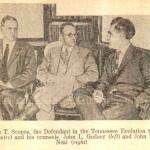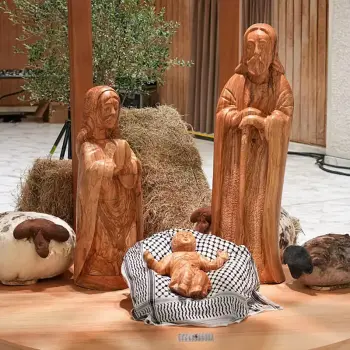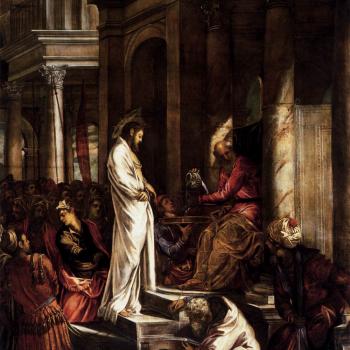The teachings of Jesus are absolutely foundational to Christian living. As Jesus Himself once said, if His followers truly love Him, they will keep His commandments (John 14:15).
Yet, far too often, Jesus is reduced to a self-help life coach. His teachings apply only or mostly to moral journeys of individual improvement. Or, His teachings are utilized to help individuals cope with worry (Matthew 6:34) or burdens (Matthew 11:28-30). The political nature of His teachings are therefore neglected, substituted instead for individualistic interpretations and applications.

Jesus is Political?
But we must first briefly further inquire as to the political nature of Jesus’s teachings. What is meant by the politics of Jesus? Or rather, the political nature of Jesus’s teachings?
As academics use the term “political,” the word refers to anything that goes beyond the private and the public. Whatever I do personally which affects only myself is not political. But my actions that affect and concern others, such as what I say in the presence of others, or what I do to others, is political.
To say that Jesus’s teachings are political is to say that Jesus did not mean for His teachings as a self-help guide. At least not in the simplistic sense of bettering oneself, overcoming worry, gaining self-confidence, and the like. His teachings had something to say about how we treat each other. And His teachings laid claim to how human relations should be navigated; even how political and economic systems should be structured.
Plucking Grain in the Field
It is this last aspect of Jesus’s teachings that we discuss here: Jesus was very concerned with how the very systems we live under are structured. To examine this, we turn to Mark 2. Though Mark is placed after Matthew in the New Testament canon, some scholars believe that Mark was actually the first of the four Gospels to be written. Indeed, Matthew and Luke often contain passages found in Mark word for word, seemingly treating Mark as a source.
In Mark 2, Jesus’s disciples are plucking grain from a field. The Pharisees see this, and they ask why they are breaking the Sabbath law. The Sabbath law comes from the Law given to Moses (Exodus 20:8–11, Deuteronomy 5:12–15). Every seventh day, Israel was commanded to rest. The Sabbath is infused in the creation story of Genesis 2, where even God rests on the seventh day after creating the heavens and earth.
Though the Law prohibited work on the Sabbath day, it was not very particular with what counted as “work”. So, the Pharisees, a sect that stressed meticulous obedience to Mosaic Law, had to apply Sabbath law where the Bible was silent. Apparently, they had agreed that plucking grain from the field violated Sabbath law. Even for a midday snack.
Which was Made for the Other?
Jesus responds to their accusation:
And he said to them, “Have you never read what David did, when he was in need and was hungry, he and those who were with him; and how he entered the house of God, in the time of Abiathar the high priest, and ate the bread of the Presence, which it is not lawful for any but the priests to eat, and also gave it to those who were with him?” (Mark 2:25-26, ESV)
It is strange that Jesus brings up this story of David. In the story Jesus cites (1 Sam. 21:1—6), David does not violate the Sabbath. Rather, David eats bread unlawfully, and he does not do so on the Sabbath.
What Jesus is doing here is that He is showing that commands, even ones made by God, can be suspended. There are conditions when obedience to God’s commands is no longer required. But this suspension of obedience does not happen arbitrarily. Jesus further elucidates in the next verse when He says that
“The Sabbath was made for man, not man for the Sabbath. So the Son of Man is lord even of the Sabbath” (v. 27)
The Purpose of God’s Laws
Laws such as keeping the Sabbath or saving the bread of the Presence for the priests are to be obeyed. But their purpose is quite outside of themselves. Their purpose is humanity.
The bread of the Presence was reserved for the priests, but when David was in need and hungry, God permitted David to eat the bread. The Sabbath was strongly commanded in the Law, but when Jesus’s disciples even needed just a snack, they were permitted to break it to pluck a few heads of grain.
Though God gives commandments, He does not give them unwaveringly. There is a view of morality called Divine Command Theory. This philosophical view holds that good and evil are determined by what God commands people to do or refrain from. However, this view does not account for the Sabbath, nor for the bread of Presence. Nor does it account for Rahab’s righteous lie in Joshua 2:4–5, which has confounded interpreters from Augustine to John Calvin to John Cassian.
God’s commands are not absolute, because they aim at something much deeper than simply obedience and disobedience. They aim at flourishing, communion, and reconciliation. Walter Brueggemann once described the Sabbath as an “act of resistance.” When rightly practiced, it frees a person from overwork and burdensome labor. When wrongly practiced, it becomes burdensome labor.
God desires harmony between Himself and His creatures, not just through the Sabbath but through other things as well, like truth-telling or holy bread. Commandments are easy ways to give us general guidelines for how to get there, but the actual path is far more complex and dynamic than commandments can communicate.
From the Sabbath to Politics
It is important for Jesus that the Sabbath serves the health and livelihood of humans. Their health and livelihood should not be sacrificed so they can obey the Sabbath. Obedience is not a good in and of itself but a means to the greater end of cultivating communion between humanity and God.
But the passage in Mark 2 tells us much more than just obeying the Sabbath. It also illuminates Scripture’s prohibition on lying, and on David eating priests’s bread.
We must therefore extend this principle even further. Commands and laws, even those made by God Himself, are made for humans. Humans are not made for those laws. When we consider political systems such as monarchies and democracies; when we look at economic systems like capitalism or socialism, this principle tells us something very important. No matter what political system you inhabit, it is supposed to be made for you. You are not made for it.
Far too often, human life is made a slave of profit, the market, the state and the nation. These things, these creations of humans, become masters of humanity. And they should not. They should be ordered towards the flourishing of humans.
Christ’s teachings on the Sabbath, when properly extended to all of life, condemns all systems which objectify, instrumentalize, and commodify humanity. Christ condemns systems which make humans into cannon fodder or servile cogs. These are the systems which beat humans down into despair.
Bearing Witness to Christ’s Lordship
The systems that properly exist for humans, on the other hand, bear witness to the lordship of Christ. In verse 27, Jesus gives very interesting reasoning. Since the Sabbath is made for humanity and not the other way around, so is Jesus lord, even of the Sabbath. Those two ideas are logically connected.
Laws, whether they pertain to Sabbath observance, paying taxes, the bread of the Presence, labor, or lying, testify that Jesus is Lord when they prioritize human life. In other words, humans are not given freedom over rules and laws because they are endowed with unalienable rights. Rather, humans deserve freedom because Jesus is Lord. Because Jesus’s lordship looks so radically different from the lords of this world who cling to power at the expense of their people.
Jesus is a King whose majesty frees captives, whose burden is light and easy (Matthew 11:28-30). And because Jesus is Lord over all, all rules, laws, and systems must never become masters of humanity. Jesus is already and always will be Lord of all, and that is what makes us free against any force that might try to bind us.
There is a reason why Jesus is so well-known for His mercy. Legally speaking, mercy happens when someone should be punished according to law, but isn’t. Political systems that lack exceptions to their rules are stone-cold, heartless, and woefully punitive. They make no room for second chances nor redemption.
But when societies allow for exceptions, they make room for redemption. When laws permit second chances, they show glimpses of Christ’s forgiveness of sins. When politics are made for humanity, Christ’s lordship is proven and shines through like the light of the world that He is. The Sabbath was made for us, not us for the Sabbath.













